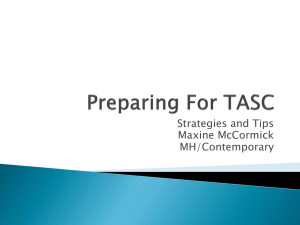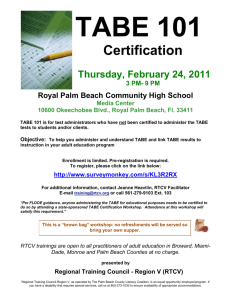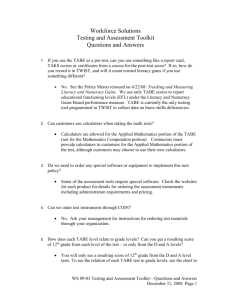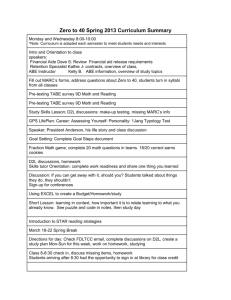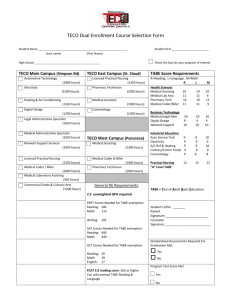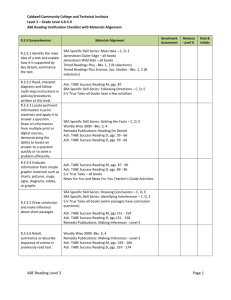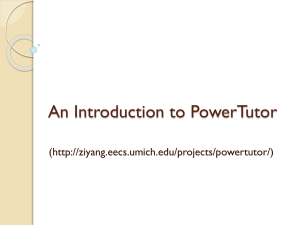Testing and Assessment Toolkit Matrix
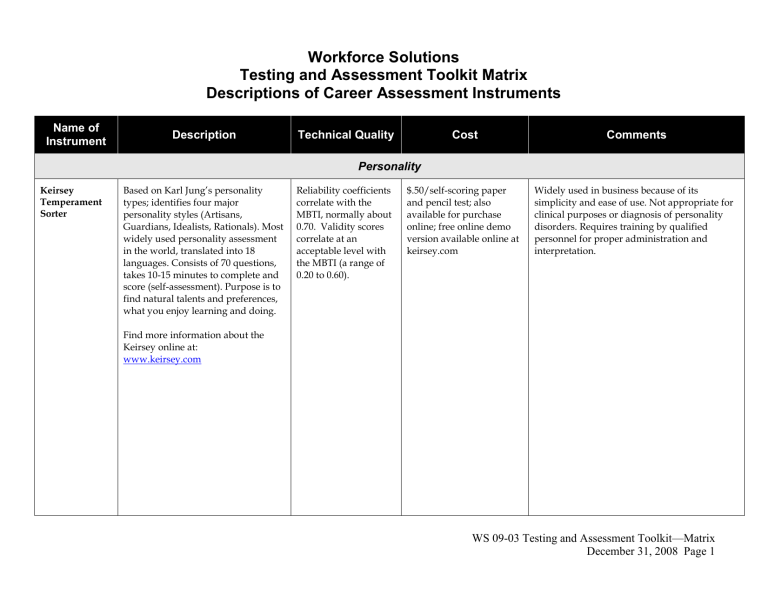
Workforce Solutions
Testing and Assessment Toolkit Matrix
Descriptions of Career Assessment Instruments
Name of
Instrument
Description Technical Quality Cost Comments
Keirsey
Temperament
Sorter
Personality
Based on Karl Jung’s personality types; identifies four major personality styles (Artisans,
Guardians, Idealists, Rationals). Most widely used personality assessment in the world, translated into 18 languages. Consists of 70 questions, takes 10-15 minutes to complete and score (self-assessment). Purpose is to find natural talents and preferences, what you enjoy learning and doing.
Find more information about the
Keirsey online at: www.keirsey.com
Reliability coefficients correlate with the
MBTI, normally about
0.70. Validity scores correlate at an acceptable level with the MBTI (a range of
0.20 to 0.60).
$.50/self-scoring paper and pencil test; also available for purchase online; free online demo version available online at keirsey.com
Widely used in business because of its simplicity and ease of use. Not appropriate for clinical purposes or diagnosis of personality disorders. Requires training by qualified personnel for proper administration and interpretation.
WS 09-03 Testing and Assessment Toolkit—Matrix
December 31, 2008 Page 1
Name of
Instrument
Description Technical Quality Cost Comments
Ability/Achievement
Tests of Adult
Basic Education
(TABE)
The TABE is designed to assess reading, mathematics, language, and spelling skills. It includes a version in Spanish and independent tests that assess basic skills in work-related contexts. TABE is available in paperand-pencil and computer-based formats. There are six different groups of TABE tests: TABE
Complete Battery, TABE Survey,
TABE Espanol, TABE Work-Related
Foundation Skills, TABE Work-
Related Problem Solving, and TABE-
PC. TABE Survey is a short form of the Complete Battery. Survey requires approximately 35 minutes;
Battery requires 3 hours. Published by McGraw-Hill.
Find more information about TABE online at: www.ctb.com
TABE has been statistically correlated to the GED tests and content has been mapped to SCANS competencies.
Reliability and validity coefficients are available in the
Technical Report.
Designed for a range of audiences (high school equivalency or
GED programs, vocational programs, community college programs, welfare-towork programs, occupational or military advancement programs, alternative educational programs, and ESL programs).
Costs range from $83.50 -
$147.50 for 25 tests. Price depends on which versions of TABE are used and quantity of order placed. Technical Report is
$26.00.
TABE Survey provides reliable estimate of an individual’s overall achievement. TABE Battery should be used when accurate scores for individual subtests are required or when necessary to demonstrate an individual has mastered specific objectives. To administer the
TABE, you must be able to read and follow the directions in the Examiner’s Manuals, calculate scores in accordance with Norms Book instructions, and function as a professional assessment administrator. Survey and
Complete Battery editions may be used to qualify students for “ability-to-benefit” status under U.S. Department of Education guidelines
(paper-pencil version only). Good tool for assisting with decisions concerning academic programs and employment, but should not be used as sole measure for making decisions.
TABE also suggests use of other information gained through interviews, transcripts, references, etc. Often used by workforce organizations, especially when customers request training assistance and do not have a
Bachelor’s degree, when customers are receiving TANF, or when employers require
TABE testing.
WS 09-03 Testing and Assessment Toolkit—Matrix
December 31, 2008 Page 2
Name of
Instrument
Description Technical Quality Cost Comments
Interest/Aptitude
O*NET
Computerized
Interest Profiler
(CIP)
The O*NET Computerized Interest
Profiler is part of a suite of assessment tools designed for career counseling, career planning and exploration (Work Importance
Locator, Interest Profile, Work
Importance Profiler, Computerized
Interest Profiler, and Ability Profiler).
All results are linked to O*NET occupations. The CIP was developed by the U.S. Department of Labor and is based on Holland’s personality theory. Requires 30-60 minutes to complete.
Find more information about O*Net assessment tools at the O*Net
Resource Center online at: http://www.onetcenter.org/tools.ht
ml
DOL/ETA adhered to high standards of the
APA, AERA, and
National Council on
Measurement in
Education in developing the O*NET career exploration tools. Analyses prove score results to be valid from both a statistical and usability perspective. Reliability coefficients are high
(0.95 to 0.97).
Individuals may use
O*NET tools freely for their own personal use.
Two of the tools are computerized instruments: the Computerized Interest
Profiler and the Work
Importance Profiler. A copy of the source code for these instruments is available by written request. The CIP paperand-pencil instruments are
$52/package of 25 copies; score reports are
$22/package of 5 copies.
User’s guide is $19.40.
Materials are available from the U.S. Government
Printing Office.
Tools must be administered by staff who provide instructions to individuals taking the assessment. Training materials are available online. Online assessments can be installed on individual computers by a local system administrator. Software is simple and easy to follow (targeted for individuals with little/no computer experience). Usually administered and analyzed individually, but group administration is possible and customers can work together as a group to discuss results.
When the CIP Network Version is used, customer data files are stored for administrator use. O*NET Career Exploration Tools would appear to be a good “fit” for workforce organizations.
WS 09-03 Testing and Assessment Toolkit—Matrix
December 31, 2008 Page 3
Name of
Instrument
Description Technical Quality Cost Comments
O*NET Ability
Profiler
Interest/Aptitude (cont.)
An O*NET product designed to identify strengths and areas that need development; identifies occupations related to strengths. Measures 9 jobrelated abilities: verbal ability, arithmetic reasoning, computation, spatial ability, form perception, clerical perception, motor coordination, finger dexterity, manual dexterity. Paper and pencil format with optional apparatus parts
(finger and manual dexterity) and computerized scoring. Designed for career development purposes and should not be used for personnel selection.
Find more information about O*Net assessment tools at the O*Net
Resource Center online at: http://www.onetcenter.org/tools.ht
ml
DOL/ETA adhered to high standards of the
APA, AERA, and
National Council on
Measurement in
Education in developing the O*NET career exploration tools. Analyses prove score results to be valid from both a statistical and usability perspective. Reliability coefficients are high
(0.95 to 0.97).
Materials include test instruments, administration manual, scoring keys, and administrator training materials. Materials are available for free downloading and printing or can be purchased from the U.S. Government
Printing Office. Test instruments @ $50/10; answer sheets $43/100; administrator manual
$8.80; scoring software
$22; administrator training manual $4.40; optional manual dexterity pegboards and finger dexterity boards available at extra cost.
Designed for workforce development professionals; results linked to O*NET occupations. Very similar to Valpar instruments. Instrument must be administered by trained workforce professional. Intended for group administration but can be administered to a single individual.
WS 09-03 Testing and Assessment Toolkit—Matrix
December 31, 2008 Page 4
Name of
Instrument
O*NET Work
Importance
Locator and
O*NET Work
Importance
Profiler
Description Technical Quality Cost Comments
Interest/Aptitude (cont.)
The Work Importance Locator is paper and pencil format and the
Work Importance Profiler is computerized. Both instruments measure six types of work values
(achievement, independence, recognition, relationships, support, working conditions). The instruments are designed to allow customers to see what is important to them in a job and identify occupations most “in line” with their values.
Find more information about O*Net assessment tools at the O*Net
Resource Center online at: http://www.onetcenter.org/tools.ht
ml
DOL/ETA adhered to high standards of the APA, AERA, and
National Council on
Measurement in
Education in developing the
O*NET career exploration tools.
Analyses prove score results to be valid from both a statistical and usability perspective.
Reliability coefficients are high (0.95 to 0.97).
Materials are available for free downloading and printing or may be purchased from the U.S.
Government Printing
Office. Work Importance
Locator Instrument - $19.80 for 25; Work Importance
Locator Score Report -
$22/5; user’s guide $15.20;
Work Importance Locator
Occupations Master List
$7.60/5; O*NET
Occupations combined List:
Interests and Work Values
$18/5.
Designed for workforce development professionals; results linked to O*NET occupations. Very similar to Valpar instruments. Instrument must be administered by trained workforce professional
